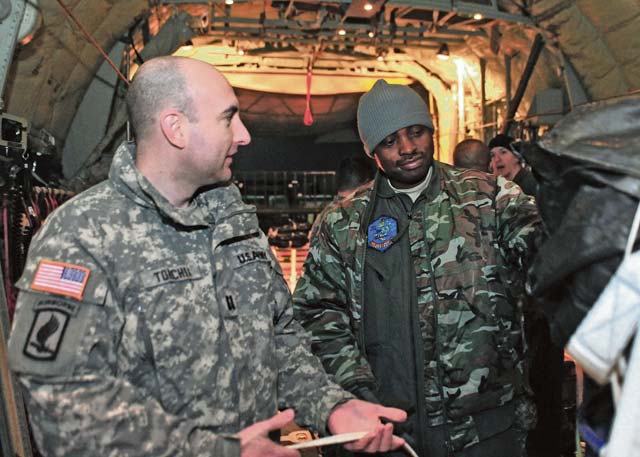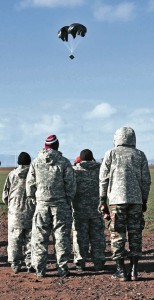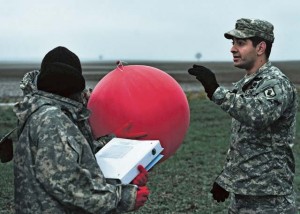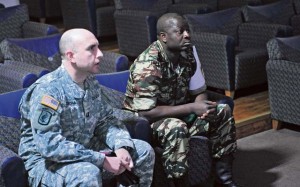
Service members from around the world converged on the KMC Feb. 3 to 7 to train international partners from Africa for Central Accord 14 Phase I.
Central Accord 14 is an international training exercise coordinated by U.S. Army Africa, and Phase I acted as an opportunity to provide familiarization training to soldiers from Burundi, Cameroon and Nigeria. U.S. personnel engaged in training, and oversight of Phase I came from the 21st Theater Sustainment Command’s 5th Quartermaster Company, 21st Special Troops Battalion, the 173rd Airborne Brigade Combat Team, C Company Long Range Surveillance, 3rd Battalion, 108th Cavalry Regiment and the Defense Medical Readiness Training Institute. Two Soldiers from the 300th Military Intelligence Brigade also took part in Phase I as interpreters.

The 173rd ABCT provided officers and NCOs to act as observers and controllers during all the training.
The “Sky Soldiers” also coordinated the training schedule, ensured all training occurred on time and even provided some assistance to the translators from the Utah National Guard, said Capt. Thomas Torchia, the officer in charge of Central Accord 14 Phase I, assigned to the 173rd ABCT.
“The 173rd is assisting with all phases of Central Accord 14, and for Phase I, we are here to make sure the training stays on track and to make sure our African partners are getting the training they need,” Torchia said. “This event is a valuable opportunity for these African soldiers to get this training in a small group environment.”
The “First in Support” Soldiers from the 5th QM Co. coordinated sleeping arrangements for all training members, arranged transportation to all training sites and provided cold weather clothing for the African partners. The riggers were also charged with conducting training in parachute rigging and air drop operations. The 5th QM Co. conducted an air drop featuring four parachute-rigged bundles for the African delegation to observe.
“Anytime we get to do an air drop or airborne training with our international partners it’s a great experience,” said Spc. Edwin Schimmer, a parachute rigger assigned to the 5th QM Co. “We trained them on how to prepare a bundle for air-drop, how to properly weigh it and how to properly label it. That’s all fine, but I think they enjoyed the actual air-drop most. They even helped us recover the bundles from the drop zone after the mission was over.”

The Soldiers from C Co. LRS provided training on basic infantry skills, including reacting to contact, setting up an ambush and breaking contact, said Sgt. Eddie Negron, the infantry tactics instructor for Central Accord 14 Phase I.
The LRS Soldiers also provided Pathfinder training, which included demonstrations on how to prepare a drop zone for an airborne operation. They instructed the African trainees on measuring wind speeds and their impact on a drop zone, how to properly mark a drop zone and how U.S. aircraft react to their markers during an operation. During the 5th QM Co. air-drop, the LRS Soldiers observed and provided feedback as the African delegation prepared a raised angle marker and assessed wind conditions, said Staff Sgt. Raymond Novak, the leader Pathfinder trainer for Central Accord 14 Phase I.
“We want these (African) soldiers to have the best understanding they can on how to prepare a drop-zone for an airborne operation,” Novak said. “They were motivated during the instruction and they were very enthusiastic when setting up the drop-zone for the air-drop mission.”
Central Accord Phase I concluded with basic combat lifesaver training from the DMRTI. The classes included how to control bleeding, how to apply a bandage, how to apply a tourniquet and airway management, said Petty Officer Justin P. Lamb, a U.S. Navy Corpsman assigned to DMRTI.
“Medical training, especially combat lifesaver, is extremely important for U.S. and foreign personnel alike,” Lamb said. “This training was effective because the African soldiers got some hands-on training with some of the equipment, and one of their medical officers even gave some of the instruction.”

Additional phases of Central Accord 14 will be hosted in Cameroon later on this year. The African delegation agreed the training they received during Phase I was valuable and would help them in the future, said Nigerian Lt. Col. Seun A. Kuponiyi.
“This training was very beneficial, and the American Soldiers taught us a lot,” Kuponiyi said. “Even though there was a language barrier, we overcame it. These classes will help us during the training in Cameroon.”


